17/12/2021
Published in
The Conversation
Javier Sánchez Cañizares
researcher of group "Science, Reason and Faith" and of Institute for Culture and Society. Professor of Master's Degree in Christianity and Contemporary Culture.
 December 17 marks the 114th anniversary of the death of William Thomson, also known as Baron Kelvin, one of the most renowned physicists of the 19th century for his contribution to thermodynamics. His noble degree scroll gives its name to the unit of temperature measured from absolute zero. Kelvin was an elder (lay leader in the Church of Scotland) of St. Columba's Church in Largs for many years, and a devout Christian throughout his life. Like many other scientists before and after him, he saw no conflict between science and his beliefs. His biographers agree that he sought solutions to problems within the normal course of nature. At the same time, he understood the laws of nature as the work of a creative intelligence, so that faith informed and supported his scientific work . The deeper he delved into his research, the closer he felt to theism.
December 17 marks the 114th anniversary of the death of William Thomson, also known as Baron Kelvin, one of the most renowned physicists of the 19th century for his contribution to thermodynamics. His noble degree scroll gives its name to the unit of temperature measured from absolute zero. Kelvin was an elder (lay leader in the Church of Scotland) of St. Columba's Church in Largs for many years, and a devout Christian throughout his life. Like many other scientists before and after him, he saw no conflict between science and his beliefs. His biographers agree that he sought solutions to problems within the normal course of nature. At the same time, he understood the laws of nature as the work of a creative intelligence, so that faith informed and supported his scientific work . The deeper he delved into his research, the closer he felt to theism.
Curiously, the new discipline that Baron de Largs went on to found together with other physicists led him to enter into controversy with the contemporary theory of evolution by natural selection, about which he had serious doubts. The problem was that the theory of evolution paid little attention to the enormous time span necessary for life to evolve, through small changes, to the complexity we know today. An indefinite age of the Earth was implicitly accepted, according to the uniformitarian geological view, which would allow random changes and natural selection to patiently perform their work work.
But things were not so simple for Kelvin who, precisely thanks to thermodynamic advances, began to make increasingly accurate estimates of how long our planet has existed. The baron's numbers did not add up and the Earth would be too young for the essay and error strategy of evolution to produce a biosphere as varied as the one we observe. These arguments caused Darwin himself headaches. However, the finding of radioactivity, at the end of the 19th century, opened up the possibility of a source of energy unknown to Kelvin, which made his calculations about the real age of the Earth irrelevant and allowed Darwinism to breathe easy. Yes. There was plenty of time for evolution.
Is there an influence of religion on the science of this controversial physicist? This influence is more subtle and lasting than what is revealed by his philosophical views on natural selection or his struggle to provide evolution with a physics-compatible framework . We must situate his religious inspiration at a deeper level: that of his thermodynamic conception of the universe. Perhaps the moment where this inspiration appears most explicitly is his 1889 speech in the Christian Evidence Society, where Kelvin rejects the idea of a perfect universe that evolves from agreement with timeless cycles and affirms that the dynamics of nature goes beyond perfect regularities, citing 2P 3,10 ("the heavens will disappear with a crash, the elements will dissolve in a blaze") as support for the temporal arrow of the universe.
The new thermodynamic paradigm, marked by the development of the Second Law and essentially shaped by Kelvin, depends crucially on the concept of "irreversible process". Baron de Largs thought that God alone was the eternal creator, it being impossible for human beings to create or destroy by themselves; but in organic decay and resistance to motion he came to conceive of "irreversibility" or "dissipation" as a central and universal feature of physical systems: mountains erode and animals die. The entropy of the universe grows until its "thermal death" is reached and it becomes impossible to extract energy from it in the form of work.
Peter Bowler notes the similarities between Kelvin's thinking and that of his brother James in this regard: "Both brothers saw their investigations of nature as a means of understanding divine creation. The motivation underlying their work in Thermodynamics was both internship and religious. The brothers' worldview centered on the source of energy that drove all natural processes. The source principal energy was God, who had created the necessary energy at the beginning, and the laws of nature he had instituted led to an inevitable decrease in the amount of energy left available for the work useful in natural processes."
If the dominant idea in eighteenth-century science had been that of equilibrium, with the forces of nature continually working to restore it, Thermodynamics showed an ever-present directionality in nature. At final, the tension between the idea of a Creator and a created world irreversibly decaying came to inspire Kelvin with something very concrete about the workings of the universe: his complementary understanding of the first two laws of Thermodynamics.
This article was originally published in The Conversation. Read the original.
![]()
